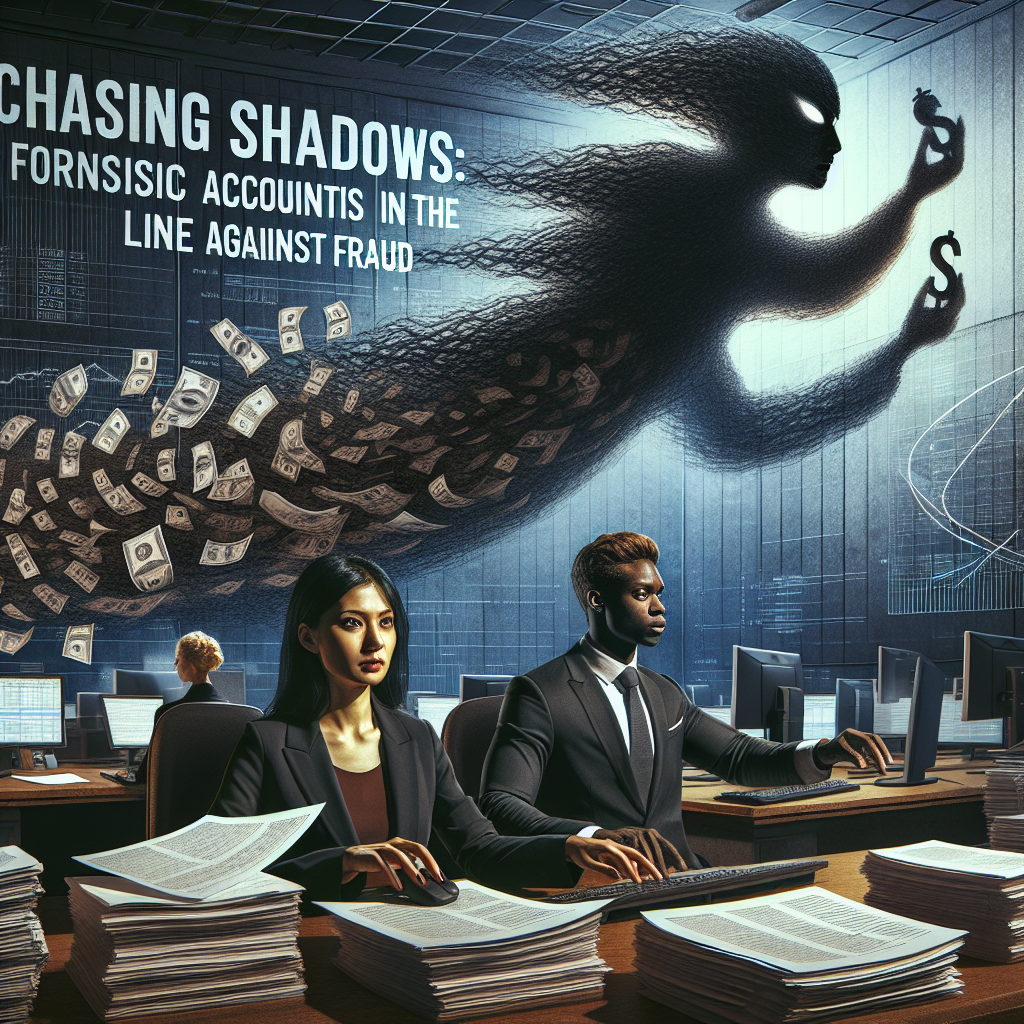
It’s a city that never sleeps. Where skyscrapers touch the sky, but as high as they rise, crime lingers in their shadows. In these urban canyons, forensic accountants wage a relentless battle against fraud, ferreting out hidden transactions and deceitful accounts. Welcome to the world of Chasing Shadows.
Contents
Who Are Forensic Accountants?
Forensic accountants are detectives with calculators. They piece together financial puzzles to uncover fraud and embezzlement. Often, they’re the unsung heroes working tirelessly in the background.
Key Responsibilities:
- Investigate Financial Records: They analyze everything from bank statements to ledger entries.
- Detect Fraud Patterns: Spot inconsistencies and peculiarities in financial documents.
- Provide Legal Support: Assist in legal proceedings and provide testimony as expert witnesses.
- Loss Quantification: Calculate the economic impact of fraudulent activity.
Forensic accountants might seem like they’re buried in paperwork at all hours, but they thrive on the challenge. You might wonder, why does fraud remain so pervasive? Because new scams appear as quickly as old ones are debunked.
The Importance of Forensic Accountants
You ever wonder why fraud never seems to go away? It’s because, as society evolves, so do fraudsters. They’re innovating at a pace that demands diligence and expertise. That’s where forensic accountants step in. Their work is vital for maintaining transparency and trust in our financial systems.
How Do Forensic Accountants Operate?
Forensic accountants operate with the precision of a surgeon and the intuition of a detective. Dive into their methods to see how they identify and prosecute fraudulent behavior.
Methods of Operation:
- Data Analysis Software: Use specialized software to detect anomalies.
- Interview Techniques: Extract crucial information through strategic questioning.
- Collaboration: Work closely with law enforcement and legal teams.
- Documentation: Meticulously document findings for court cases.
With these techniques, forensic accountants catch schemes even the most careful fraudsters try to hide. These financial sleuths can sniff out deceit like a bloodhound on a scent trail.
Recent Trends in Fraud and Forensic Accounting
Fraud doesn’t rest. As we advance technologically, so do fraudulent schemes. In recent years, we’ve seen significant trends change the landscape of forensic accounting.
- Digital Fraud: With more online transactions, tracking digital fraud has become crucial.
- Cryptocurrency Investigations: Cryptocurrencies introduce new layers of complexity and anonymity.
- Cross-Border Frauds: Globalization increases collaborative fraud across borders.
In this rapidly changing environment, staying ahead of fraudsters isn’t just a job; it’s a necessity.
Use of Technology in Forensic Accounting
Technology is not only a tool for fraudsters but also a formidable ally to forensic accountants. New technologies enable quicker, more accurate fraud detection.
Technologies Revolutionizing the Field:
- AI and Machine Learning: Predict fraud patterns and automate tedious tasks.
- Blockchain: Use transparent ledger systems to verify transactions.
- Forensic Data Analytics: Analyze large datasets quickly for suspicious activities.
Technology provides the edge forensic accountants need to stay ahead. But it doesn’t stop there. They constantly adapt to whatever new tech fraudsters use next.
Detailed Table on Chasing Shadows
| Aspect | Details |
|---|---|
| Role of Forensic Accountants | Detect and prevent financial fraud through meticulous examination and analysis. |
| Key Skills | Analytical thinking, attention to detail, strong ethics, and financial acumen. |
| Typical Cases | Embezzlement, money laundering, fraud investigations, insurance claims. |
| Challenges | Evolving fraud tactics, technological advancements, cross-border complexities. |
| Technological Tools | AI, blockchain, forensic data analytics, digital forensics software. |
| Collaboration | Works with legal teams, law enforcement, corporate management to resolve cases. |
| Outcome | Prosecution of fraudsters, recovery of funds, deterrence of future fraud activities. |
In-Depth Questions
How do forensic accountants detect fraud in the age of digital currencies?
With the rise of cryptocurrencies, forensic accountants face unique challenges. Digital assets provide unprecedented transaction anonymity. So, how do they tackle this?
Blockchain Analysis: Forensic accountants delve into blockchain technology. Even if transactions are anonymous, they’re permanently recorded. By analyzing data patterns, they can trace suspicious wallet activities.
Collaboration with Tech Experts: Combining efforts with technology specialists is essential. These experts understand the algorithms behind cryptocurrencies, providing crucial insights.
Developing Regulations: Accountants work with regulators to establish frameworks that enhance transparency. As regulations evolve, there’s more clarity in financial dealings.
What specific skills make forensic accountants effective in combatting fraud?
Forensic accountants aren’t your average number crunchers. They possess a unique skill set.
Analytical Skills: To spot discrepancies, they need razor-sharp analytical abilities. This skill allows them to identify inconsistencies at a glance.
Attention to Detail: Every number matters. Missing even a tiny detail can derail an investigation.
Ethical Judgment: Their integrity is crucial. They must approach cases without bias, ensuring their findings are accurate and impartial.
Combining these skills enables them to maintain the delicate balance between financial investigation and legal accuracy.
How does globalization affect forensic accountants’ work against fraud?
Globalization brings the world closer, but it complicates fraud detection. Why? Because fraudulent schemes now cross borders.
Cross-Border Collaboration: Accountants need to work with international regulators. Understanding diverse legal frameworks is essential for successful investigations.
Cultural Sensitivity: Communications vary across cultures. Effective interaction requires awareness and sensitivity.
Technology Utilization: Globalization demands sophisticated tech solutions. From translation tools to advanced data analytics, technology bridges gaps.
Handling fraud at an international level is complex, but it’s a challenge forensic accountants are ready to face.
Conclusion
In the world of Chasing Shadows, forensic accountants stand on the front lines. They’re the guardians against financial deceit, wielding technology and tenacity. As fraud diversifies, so does their expertise.
In this city that never sleeps, they ensure we dream safely, knowing our finances are in good hands. Curious to learn more about how forensic accountants tackle multilayered Frauds? Visit Investment Shoax for a deep dive into their riveting world.
So next time you walk these streets, think of those chasing shadows, ensuring our city’s integrity remains solid.






